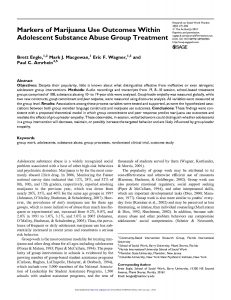Markers of marijuana use outcomes within adolescent substance abuse group treatment
 Abstract/Objectives: Despite their popularity, little is known about what distinguishes effective from ineffective or even iatrogenic adolescent group interventions.
Abstract/Objectives: Despite their popularity, little is known about what distinguishes effective from ineffective or even iatrogenic adolescent group interventions.
Methods: Audio recordings and transcripts from 19, 8—10 session, school-based treatment groups comprised of 108, substance abusing 10- to 19-year olds were analyzed. Group leader empathy was measured globally, while two new constructs, group commitment and peer response, were measured using discourse analysis. All variables were measured at the group level.
Results: Associations among these process variables were tested and supported, as were the hypothesized associations between both group member language constructs and marijuana use outcomes.
Conclusions: These findings were consistent with a proposed theoretical model in which group commitment and peer response predict marijuana use outcomes and mediate the effects of group leader empathy. These observable, in-session, verbal behaviors could distinguish whether adolescents in a group intervention will decrease, maintain, or possibly increase the targeted behavior and are likely influenced by group leader empathy.
Engle, B., Macgowan, M.J., Wagner, E.F., & Amrhein, P.C. (2010). Markers of marijuana use outcomes within adolescent substance abuse group treatment. Research on Social Work Practice, 20(3), 271-282. doi:10.1177/1049731509347855
